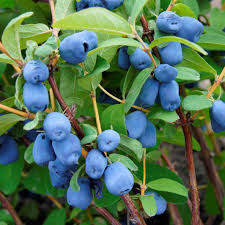Native to Siberia, which indicates extreme cold hardiness and therefore great for northern gardens in USDA Zones 2-8 in the U.S., the Aurora Honeyberry is a relatively new introduction that produces some of the first fruits of the year. White flowers come in late winter to early spring followed by more abundant, larger and sweeter berries that start coming in mid to late spring. The nutrient-rich and antioxidant-packed blue colored berries are similar in flavor to blueberries combined with raspberries and a texture like kiwis. They can be eaten fresh off the bush or used in baking or to make jams and jellies. Aurora is self-fertile but as with blueberries will produce a heavier crop when pollinated with another variety, such as 'Tundra". Aurora forms an attractive upright rounded shrub 4 to 6 feet tall and equally as wide that serves well as a specimen, grouping or hedge in the fruit garden or the ornamental landscape.
Honeyberry ‘Aurora’
Name Haskap 'Aurora' Plant Type Perennial, Shrub Zone 2-8 Height 5' Width 5' Growth Habit Upright, Bush Growth Rate Moderate Bloom Time March-April Light
RequirementsFull Sun (>6 hrs. Direct Sun)
Part Shade (4-6 hrs. Sun)
Water Needs Average Water Needs
Soil Type Average - LoamySoil Quality
Moist, Well-drained
Animal
ResistanceSomewhat when estblished Tolerance Urban pollution Uses Borders
Specimen
Mass Planting
Origin Siberia Attracts
Wings:
Bee Friendly

